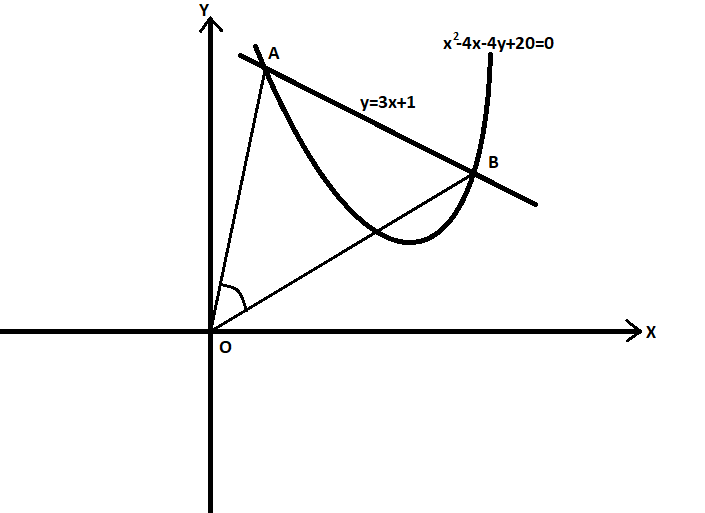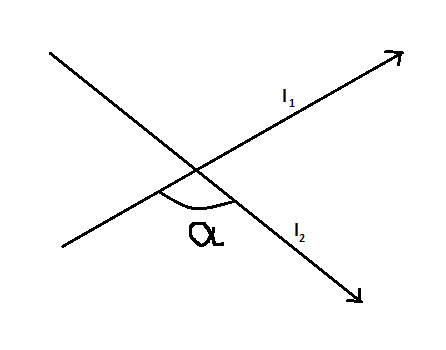Question
Question: If a line \(y = 3x + 1\) cuts the parabola \({x^2} - 4x - 4y + 20 = 0\) at A and B, then the tangent...
If a line y=3x+1 cuts the parabola x2−4x−4y+20=0 at A and B, then the tangent of the angle subtended by line segment AB at origin is
A. 20583
B. 20983
C. 21583
D. None of these
Solution
In the given question y=3x+1 is the equation for line. Line is defined as a straight one-dimensional figure that ends infinitely in both the directions and is of no thickness. Also the given equation x2−4x−4y+20=0 is of parabola. Parabola is defined as a curve whose every point is at an equal distance from a fixed point, also known as the focus and a fixed straight line, also known as the directrix.
Complete step by step solution:
At first we will find the coordinates of point A and point B. For this we will solve the equation of the straight line and the equation of the parabola, i.e. y=3x+1 and x2−4x−4y+20=0 respectively. Let us name them as
y=3x+1 {equation (1)}
x2−4x−4y+20=0 {equation (2)}
From equation (1), we have y=3x+1. We will put this value of y in equation (2) such that it becomes
⇒x2−4x−4y+20=0
⇒x2−4x−4(3x+1)+20=0
On simplifying further, we get
⇒x2−4x−12x−4+20=0
⇒x2−16x+16=0
On using the quadratic formula i.e x=2a−b±b2−4ac, we will get
⇒x=2×1−(−16)+(−16)2−4×1×16 or ⇒x=2×1−(−16)−(−16)2−4×1×16
On simplifying the expression under the square root, we will get
⇒x=216+256−64 or ⇒x=216−256−64
⇒x=216+192 or ⇒x=216−192
On substituting the value of 192=83, we will get
⇒x=216+83 or ⇒x=216−83
⇒x=8+43 or ⇒x=8−43
Since, we have two values of x therefore we will find two values of y by putting each value of x in equation (1).
For x=8+43, we have
⇒y=3x+1
⇒y=3(8+43)+1
On simplifying further, we get
⇒y=24+123+1
⇒y=25+123
So we have the coordinates of point A as (8+43,25+123).
And for x=8−43, we have
⇒y=3x+1
⇒y=3(8−43)+1
On simplifying further, we get
⇒y=24−123+1
⇒y=25−123
So we have the coordinates of point B as (8−43,25−123).
As the question is that we have to find the tangent of the angle subtended by line segment AB at origin. The question can be understood more clearly by the figure given below:

So from the figure, we get to know that we have to find the angle between line AO and line BO. But for this, we will have to find the equations for these lines.
Hence, we will use the two-point method to form the equation of the line. It states that if two points P(x1,y1) and Q(x2,y2) are given then the equation for the line PQ can be given as
(y−y1)=x2−x1y2−y1(x−x1)
For the line OA, we have O(0,0) and A(8+43,25+123). Hence the equation of OA will be
⇒(y−0)=(8+43)−0(25+123)−0(x−0)
⇒y=8+4325+123x
Since the denominator contains a complex number therefore we will have to rationalize it, such that
⇒y=(8+4325+123×8−438−43)x
⇒y=(8+43)(8−43)(25+123)(8−43)x
On multiplying both the expression together in the numerator and denominator, we will get
⇒y=(8)2−(43)2200+963−1003−144x
⇒y=(64−4856−43)x
On simplifying the denominator further, we get
⇒y=1656−43x
⇒y=414−3x
Hence, we have the equation for line OA as y=414−3x.
For the line OB, we have O(0,0) and A(8−43,25−123). Hence the equation of OB will be
⇒(y−0)=(8−43)−0(25−123)−0(x−0)
⇒y=8−4325−123x
Since the denominator contains a complex number therefore we will have to rationalize it, such that
⇒y=(8−4325−123×8+438+43)x
⇒y=(8−43)(8+43)(25−123)(8+43)x
On multiplying both the expression together in the numerator and denominator, we will get
⇒y=(8)2−(43)2200+1003−963−144x
⇒y=(64−4856+43)x
On simplifying the denominator further, we get
⇒y=1656+43x
⇒y=414+3x
Hence, we have the equation for line OB as y=414+3x.
Let us name the equations for line OA and line OB respectively as
y=414−3x {equation (3)}
y=414+3x {equation (4)}
The given equations are in the form of y=mx where m is known as the slope of the equation. So we have
mOA=414−3, and
mOB=414+3
Now, it must be known that if there are two lines named l1 and l2 such that their slopes are m1 and m2 respectively, then the tangent of the angle between the two lines namely l1 and l2 can be given as
tanα=∣1+m1m2m1−m2∣
Now to find the tangent of the angle θ between line OA and line OB having slopes mOA and mOB respectively, we will apply the above given formula such that
tanθ=∣1+mOAmOBmOA−mOB∣
On substituting the required values, we will get
⇒tanθ=∣1+(414−3)(414+3)414−3−414+3∣
⇒tanθ=∣1+(4×4(14−3)(14+3))4(14−3)−(14+3)∣
On simplifying both the numerator and denominator further, we will get
⇒tanθ=∣1+16(14)2−(3)2414−3−14−3∣
⇒tanθ=∣1+16196−34−23∣
On further simplifying the fraction in the numerator and the denominator, we get
⇒tanθ=∣1+161932−13∣
⇒tanθ=∣16193+162−3∣
On simplifying the denominator, we will get
⇒tanθ=∣162092−3∣
⇒tanθ=∣2−3×20916∣
On simplifying the expression on the right hand side of the equation, we will get
⇒tanθ=∣209−83∣
On applying mod, we will get
⇒tanθ=20983
Since the tangent of angle between line OA and line OB is the tangent of angle subtended by line segment ABat origin.
Hence, tangent of the angle subtended by line segment ABat origin is 20983.
Therefore, the correct answer is option C.
Note:
It must be kept in mind that the tangent of the angle subtended by any line segment at origin is different from the slope of that line. Also the slope of the line is the tangent of the angle between the line and the positive x-axis in the anticlockwise direction.
